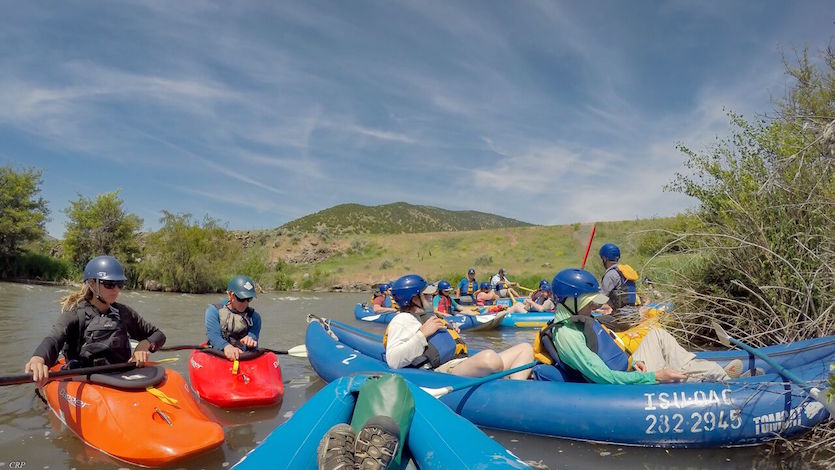Idaho State University MILES program hosts Idaho Adventure Learning Workshop for teachers
June 16, 2017

POCATELLO – The Managing Idaho’s Landscape for Ecosystem Services (MILES) program at Idaho State University held an Adventure Learning Workshop for middle and high school teachers from across Idaho this month.
According to the workshop’s website, Adventure Learning is designed to build understanding of the various ways we benefit from healthy, functioning ecosystems, and the challenges we face as a state when trying to manage our resources to maintain balance in these systems in the midst of growing urbanization.
This year’s workshops included a myriad of activities.
On the first day of the workshop, the group conducted an exploration activity for the Portneuf ecosystem by conducting social science research at Edson Fichter Park.
The next day was spent on a float trip down the Portneuf River. While they were there, the group studied river ecology, invasive species, and agriculture.
The team wrapped up the week by studying herpetology, or the study of amphibians, and flora at the O’Neill Preserve and investigating storm water and constructed wetlands at Sacagawea Park.
Some of the participants took part as “digital learners,” so although they did not have the opportunity to physically travel to the locations with the group, they could still participate in the online aspects of Adventure Learning.
Over the course of the workshop, participants posted in a daily blog dedicated to recording their experiences, thoughts, and lessons from the workshops.
All participants also created their own digital stories to introduce themselves and document some of their experiences and beliefs in regard to ecosystem and land conservation. Additionally, the participants were given the opportunity to produce lesson plans based on what they learned over the course of the workshops.
Many of the participants expressed excitement to learn more about the ecology surrounding Pocatello, especially those who are from the area. They also communicated concern about some aspects of it and ideas for how the community could work to protect our environment in the future.
Arlyn McCullock, an art and Spanish teacher from Franklin Middle School, said in one of his blog entries that their float trip down the Portneuf River reaffirmed his love for the river.
“I grew up fishing in the Portneuf River with my great-grandparents, but the two days we spent along the Portneuf made me love it even more,” he said. “I want to help it. I feel sorry for it as it gets closer to Pocatello, but I look at it like a favorite student who has messed up.”
Dani Summerill, an earth science teacher from Franklin Middle School who participated as a digital learner this year, said that she felt similarly when she attended Adventure Learning in 2016. In her words, she felt as though the community had neglected the Portneuf.
Participants from other areas of Idaho were also interested in protecting the local ecology.
Tia Talbot, a math and science teacher at Malad High School, said she hopes for the best for the Portneuf River’s future.
MILES is a National Science Foundation (NSF) program that began in 2013 and encompasses large regions of Idaho. This project is receiving input for researchers from a variety of academic disciplines from ISU, Boise State University and the University of Idaho. The five-year, $20 million grant is funded by the NSF’s Experimental Program to Stimulate Competitive Research (EPSCoR).
For more information on the MILES Adventure Learning workshops, contact Rosemary Smith at smitrose@isu.edu or (208) 282-4918.

